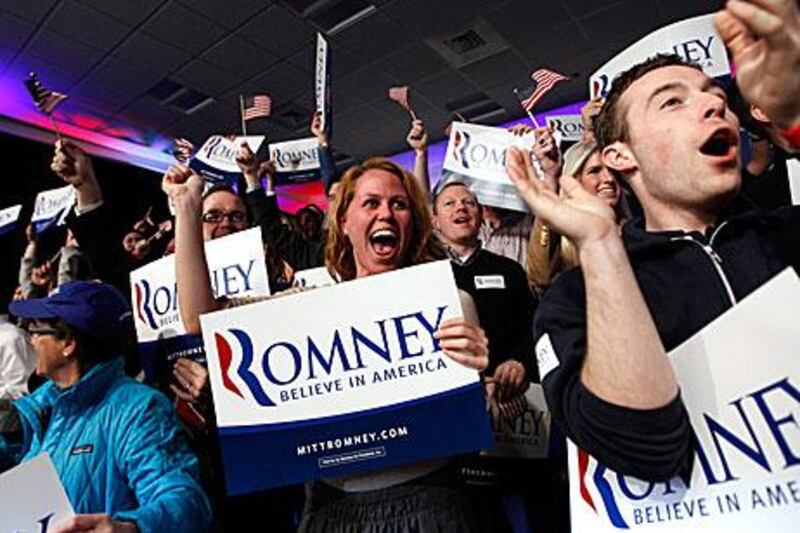WASHINGTON // With a second win in as many contests, Mitt Romney, the former governor of Massachusetts, is beginning to look like the Republican Party's inevitable choice to challenge Barack Obama for the US presidency on November.
It is of course far too early for a coronation. Mr Romney may be the first Republican to win the first two votes in a presidential campaign since 1976, but there is still a long way to go.
Yet he is already topping polls in the next race, South Carolina on January 21, a politically and socially conservative state that is unlikely to do much for his closest rivals in New Hampshire, Ron Paul, a Texan congressman, and Jon Huntsman, a former governor of Utah.
"Unless lightning strikes, Romney is the nominee," said Jeffrey Weiss, a Washington-based political consultant who has been involved in past Republican presidential campaigns. "Romney has run a tight, disciplined campaign, much like he has run his businesses."
While more orthodox conservatives may fare better in South Carolina, Rick Santorum, the former Pennsylvania senator who ran so close to Mr Romney in Iowa, has lost much of the momentum he gained in the early caucus and never had much money to campaign with in any case.
Better funded is Rick Perry, the Texas governor, who essentially passed over New Hampshire. While he is still nominally in the running, it seems a matter of when rather than if the gaffe-prone former Democrat - who in one debate failed to remember the three federal agencies he himself proposed to eliminate - drops out of the race.
Newt Gingrich, meanwhile, the former leader of US House of Representatives, has vowed to continue the fight. With a political group that is supporting him recently receiving US$5 million (Dh18.3m) from a billionaire casino mogul, Sheldon Adelson, Mr Gingrich should be able to go for a while longer.
A supporter of Benjamin Netanyahu, Israel's prime minister, Mr Adelson owns a free newspaper in Israel and waged a publicity campaign against Ehud Olmert, the former Israeli prime minister, when he seemed serious about peace talks with the Palestinians.
He has no doubt seen in Mr Gingrich's denial of a Palestinian identity a kindred spirit and is funding ads through a so-called super PAC attacking Mr Romney's jobs record as a venture capitalist.
Super PACS, or political action committees, function independent from campaigns, but can openly advocate for a candidate and raise unlimited amounts of money from individuals, corporations and unions.
But even with Mr Adelson's cash, Mr Gingrich has a lot of ground to make up. He flailed in Iowa and only registered 10 per cent support in New Hampshire. And though he has generally fared well in televised Republican debates, he has a problematic past record both politically and personally. He was found guilty of ethics violations while speaker of the house and his admitted past adultery sits uneasily with the family-orientated conservative base of his party.
Mr Weiss said he thought Mr Gingrich would likely try to stay the course a little longer to "drive the agenda" as well as "do some damage" to Mr Romney. It was the ads of a super PAC supporting Mr Romney that did so much to undermine Mr Gingrich before the Iowa caucus, when he was seen as Mr Romney's closest rival.
Not any more. A January 10 national Gallup poll found that Mr Romney is the only candidate that a majority of conservative as well as of moderate/liberal Republicans (59 per cent of both camps) find "acceptable" as their nominee.
It is, in other words, Mr Romney's race to lose now. While he has been criticised by some for running a boring campaign, it has also been remarkably steady. He has never polled outside the top two, unlike his rivals, and he made it a point early, moreover, to rise above the Republican fray and train his fire on Mr Obama.
Castigating the president again and again on his jobs record, for undermining American power abroad and for planning to turn the country into a "socialist European welfare state", Mr Romney has tried to run his campaign as if he were already going against Mr Obama.
The only one of Mr Romney's Republican rivals who has shown any consistency is Mr Paul. The Texas congressman has struck a chord with a significant segment of the Republican Party that is tired of what it sees as adventurism abroad and remains suspicious of government interference at home.
His consistency has seen him garner more than 20 per cent of the vote in both races so far, and with a platform that also includes the legalisation of marijuana, he has energised a youthful base that runs across party lines.
If his support holds up, said Mr Weiss, Mr Paul will be aiming to last the distance until the Republican National Convention at the end of August, to shape the party platform. But while Mr Paul's support has been passionate and consistent, it has also never seriously threatened Mr Romney.
The man who made a name for himself organising the 2002 Winter Olympics, might just be eyeing Florida, which holds it primary - the country's fourth - at the end of the month, as the last poll before a clear downhill stretch home.
okarmi@thenational.ae






